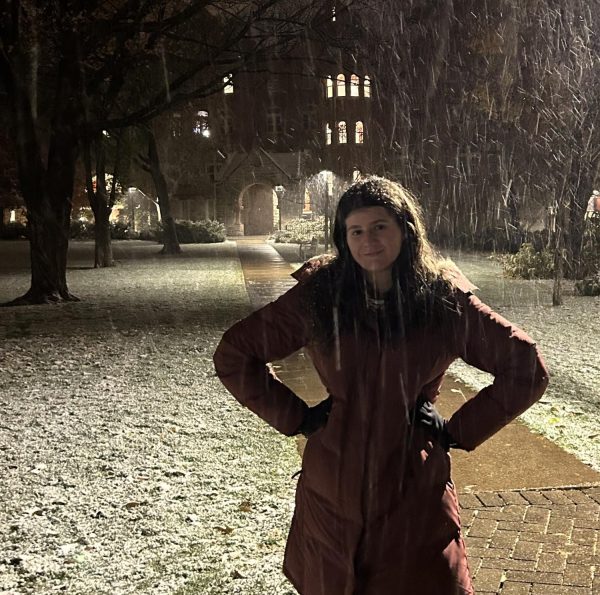With a visit from Dean of Faculty Tom Halverson and a proposed constitutional amendment to anonymize representatives’ votes through a Google Form, Macalester College Student Government (MCSG) had a packed agenda for their Oct. 24 meeting.
Halverson described his role to begin proceedings — overseeing curricular and personnel changes within departments — before addressing a list of pre-written questions from the Legislative Body (LB).
70 percent of professors are tenured or tenure-track, and the rest are visiting. For a new tenure position to open, Halverson explained another tenured professor must retire. That tenure-track line then opens to applications from every department. After applications are reviewed by a series of committees, the position opens to a formal, year-long hiring process. Although increasing diversity in the demographics of tenured professors may take longer due to this timeline, Halverson is proud of Mac’s hiring process.
“If you look at that pool, it’s a really incredibly diverse set of people we brought to campus,” Halverson said. “It’s not represented on the whole faculty, because people like me were hired before you were born, so change is really slow that way. But I think that I’m really excited about it, and proud about the work you’ve been doing here. Because it’s not just getting people into the door, it’s actually finding a community where faculty can come and feel welcome.”
The LB then heard from Mac GPT on a Community Chest fund request for $1,275 to fund lunch for 75 people at $15 a head.These funds came from the Community Chest last year and the LB found no reason to break from tradition. The vote passed, with 23 in favor, none against and one abstention.
The meeting moved to a discussion about a proposed amendment to how MCSG conducts votes.
Sophomore class representative AnLian Krishnamurthy ’27 proposed that, “instead of doing the raised hand voting system we do right now, [MCSG should] have an anonymous form that we use to vote, and the results get published without people’s names.
“The way we [vote] right now, the count gets published, but not the names of who voted what. So that’s not going to change in my amendment. My amendment is solely seeking to change the way we actually do voting in MCSG. So like, instead of raising our hands, we’ll instead fill out a form so you’re not influenced by the way other people vote.”
Sadofsky had concerns: “I just want to say that I think it’s worth discussing and revisiting all of our practices, but at the same time, I guess my caution against going this direction is that I think it sends a message to the student body that we are even less willing to be transparent.”
Sophomore class representative Aditya Choubal ’27 supported the proposal.
“It’s easy to say you should just stand up for what you believe in and you should, but in the moment when everyone’s voting, it’s much harder to actually vote your conscience,” Choubal said. “I will say a lot of times I’ve wanted to deny something, I’ve actually abstained instead.
Krishnamurthy and Choubal have abstained frequently throughout their MCSG tenures.
“I am here as a junior class rep and so I am voting with what I think that the juniors care about,” junior class representative Marina Moberg ’26 explained. “I’m thinking about the juniors as a class and what my junior peers and classmates have told me, and that’s how I vote. I’m not voting on my personal opinion, so I think that I encourage everyone else here to do the same.”
Moberg addressed Choubal directly: “I’m very disappointed that’s not a reflection of your vote.”
Academic Affairs Committee (AAC) Chair Tristan Niedzielski ’25 argued strongly against an anonymous system to cast genuine votes:
“[I think it] speaks incredibly poorly of the moral character of people who are not willing to stand up and say ‘hey, I’m voting this way’ in the moment,” Niedzielski said. “By saying ‘I’m not willing to do that,’ you’re saying ‘I am a person who is willing to leave behind my morals, based on what my friends might have voted.’ That represents us incredibly poorly to the broader community.”
Senior class representative Elizabeth Ekstrand ’25 suggested that representatives’ voting records should be more accessible to the Macalester community, but not accessible to the general public, due to concerns about harassment. Sadofsky echoed this sentiment, discussing his remarks at an MCSG meeting on Dec. 9, 2021, when he faced online harassment for supporting a bill.
First-year representative Cem Ozil ’28 supported a confidential voting system, like the one in Krishnamurthy’s amendment, but had reservations about anonymity. Ozil feels that the influence of peers and the fact that students currently cannot conveniently find how representatives voted already compromises voter integrity.
The meeting concluded with announcements from the Cabinet, committees and individuals. Chloe Xu ’28 reported the Student Organizations Committee (SOC) is reviewing a few charters. The committee voted against chartering Scots in the Cities due to overlap overlap with the Community Engagement Center.
Financial Affairs Committee (FAC) Chair Luke Evans ’26 reported that FAC had rejected one request from Chess Club and approved a second one. They also rejected a request by Questbridge that has been appealed, which the LB will hear next meeting.
First-year class representative Lina Sohl ’28 shared from AAC that Graduate School Admissions Test (GSAT) fund requests had closed. The committee is considering shifting how GSAT grants work by lowering the amount of acceptances in order to increase the size of the grant.
Niedzielski announced a resolution in support of Mac for Palestine’s financial divestment proposal is in the works and invited any members interested in collaborating to meet after the meeting.
Sadosfky concluded the meeting by asking any members of the LB to reach out to him if they had opinions on what the MCSG Instagram should be posting and why.






